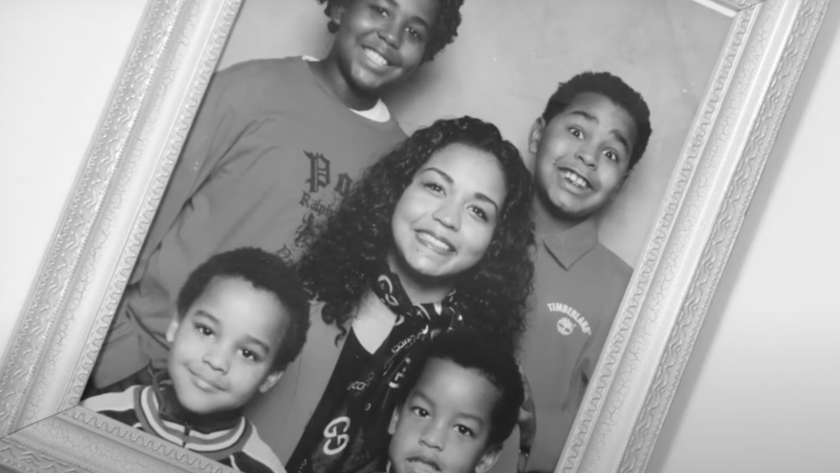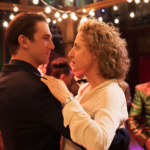BFI’s London Film Festival is in town! The FilmSoc Blog is back for the 64th edition of one of Europe’s largest film festivals, delivering a first look at the hits and misses of the 2020-21 season.
Lydia De Matos reviews Garrett Bradley’s documentary exploring the life of Fox Rich, the bonds between families, and the American justice system.
Time very rarely does what we want it to. The clock cannot be turned back to undo mistakes or relive more joyous times, it cannot be moved forward to speed through that which we would rather not endure, and it cannot be paused, no matter how much we would like to make a moment last forever. Perhaps one of the few antidotes to this malady is film, where any number of moments can be preserved, replayed and even reversed or erased. It is magical in that way, in its ability to convey and preserve time itself. Indeed that is what Garrett Bradley achieves in her newest documentary, the aptly named Time. She presents a selection of moments which together, tell the story of twenty-one years in the life of Sibil Fox Richardson (or Fox Rich, as she prefers to be called), as she fights for her husband’s release from prison.
However, to credit this film solely to Bradley would be a mistake. Time would not exist in its current form were it not for a bag of videotapes entrusted to the director by Fox Rich on the last day of filming a short documentary Bradley had been making about her. George Richardson, Rich’s husband, was sentenced to a sixty year prison sentence without parole for a robbery the couple committed, along with their nephew, when they were newly-wed and desperate to keep their business afloat. Rich, after taking a plea deal, was sentenced to thirteen years, serving three and a half before being granted release. The videotapes document what followed. The life Rich lived raising their six children not as a single mother, but one forcibly parted from her partner as well as playing the role of a father to her children. Filmed on a miniDV camera over the course of eighteen years, the videotapes are largely home movies and video diaries, documenting the minutiae of life: those small moments often missed or taken for granted are all painstakingly chronicled by Rich for her husband.

Bradley has carefully curated a selection of these videos, arranging them alongside newer footage shot by herself and a trio of cinematographers. As such, it’s impossible not to consider Time a joint effort, created by Rich as much as Bradley. The new footage is perhaps a little too crisp in comparison to the rich texture of the miniDV footage, but is beautiful nonetheless, and the dissimilarity allows for easy distinction between old and new. It also manages to never feel intrusive, only incredibly intimate, matching Rich’s tapes so perfectly in tone that it’s almost as though Bradley, too, is creating something for Richardson. Filming his wife as Rich filmed her own children, with loving intimacy and in intricate, beautiful detail.
The path of the lazy documentarian was available to Bradley. Thankfully, it is one she decided not to tread. Rather than presenting her subject and collaborator’s story in a simple, linear fashion, from the couple’s trial to the fight for Richardson’s freedom, she flits between old and new, then and now, past and present. What seems like an impossible task – conveying the full weight of twenty-one years of a loved one’s absence – is achieved through that oldest of editing techniques: Kuleshovian juxtaposition. Rather than simply being told of the effect of Richardson’s absence, we are forced to bear witness to it. From the contrast between images of the couple’s youngest children as toddlers, talking excitedly into the camera, and the sound of their adult voices, to Rich’s constant, polite phone calls to judges’ offices, only ever showing her anger at the system in private, where it won’t affect her husband’s case. Not a single day passes unaffected by a mistake made out of desperation two decades ago.
Thus, Bradley redirects us from the couple’s crime to that of the system, asking not what they did, but instead showing plainly, the destructive effect of incarceration. This is not to say that the couple’s crime is ignored – ample time is dedicated to Fox Rich’s reckoning with forgiveness – but rather, that it is not the focus, nor should it be.
‘This system breaks you apart. It is designed just like slavery to tear you apart. And instead of using the whip, they use mother time … The experience itself is just like when they used to hang people but barely hang them, and leave their feet just tiptoeing around in the mud.’
These are Rich’s words, who spends her spare time speaking publicly in favour of prison abolition, and helping those who are in similar situations. While the description of prison as modern slavery may still shock a few, it certainly shouldn’t. The United States’ thirteenth amendment may have been intended to abolish slavery, but it merely reformed it. The amendment leaving open a loophole wherein involuntary servitude was still legal so long as it was used as ‘punishment for crime whereof the party shall have been duly convicted’. The evidence of this is visible in George Richardson’s case. The Louisiana State Penitentiary, where he is held, has an interesting nickname: Angola, named so as it was built on the grounds of a former slave plantation of the same name. The comparison runs deeper than just name and history however, as prisoners at Angola are required to labour in the fields of the prison farm for as little as two cents an hour, many of them picking cotton– the guards there are even referred to as ‘freemen’.

Although it is by no means a new idea, the continuation of American slavery through mass incarceration is a topic that has received renewed attention in recent years, from Ava DuVernay’s 13th, to Douglas Blackmon’s Slavery By Another Name and Michelle Alexander’s The New Jim Crow. Bradley’s film differs drastically in its intent concentration on the particular rather than the general. It is a film of details, documenting the ruinously suffusing effects of incarceration; its thievery of that most precious of substances: time.
As often as our language lays claim to time; our ability to waste it, lose it, borrow or manage it, in reality it is something we are helplessly bound to, hurtling forward with little knowledge of what might lie ahead. There is no option to wind back the clock, to undo it all and try again. We can only ask ‘What if?’. I won’t spoil Time’s very last moment, it deserves to be seen. But let me hint at it and say that if we cannot reverse time, then let us be thankful for cinema, where anything is possible, and where we can be reminded that those versions of ourselves, the ones who are innocent to any future suffering, still exist, fixed at a point in time where they are blissfully happy.




